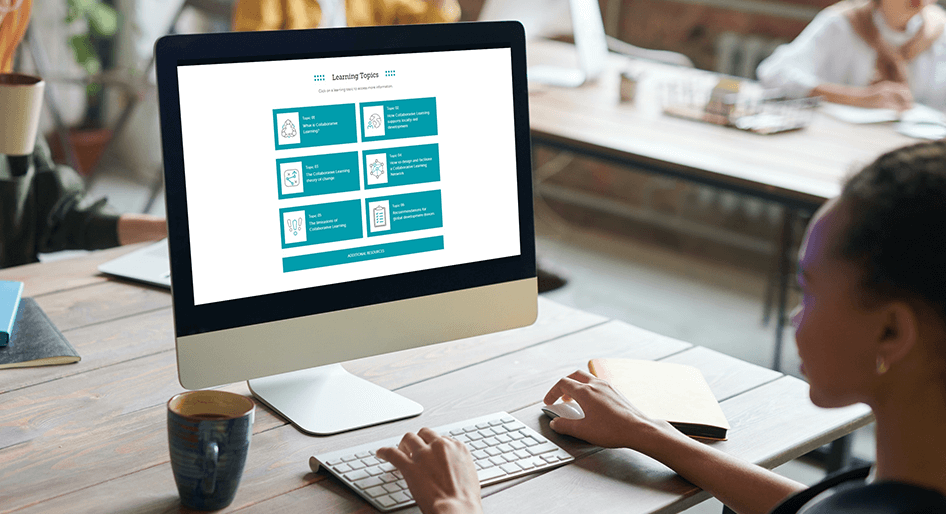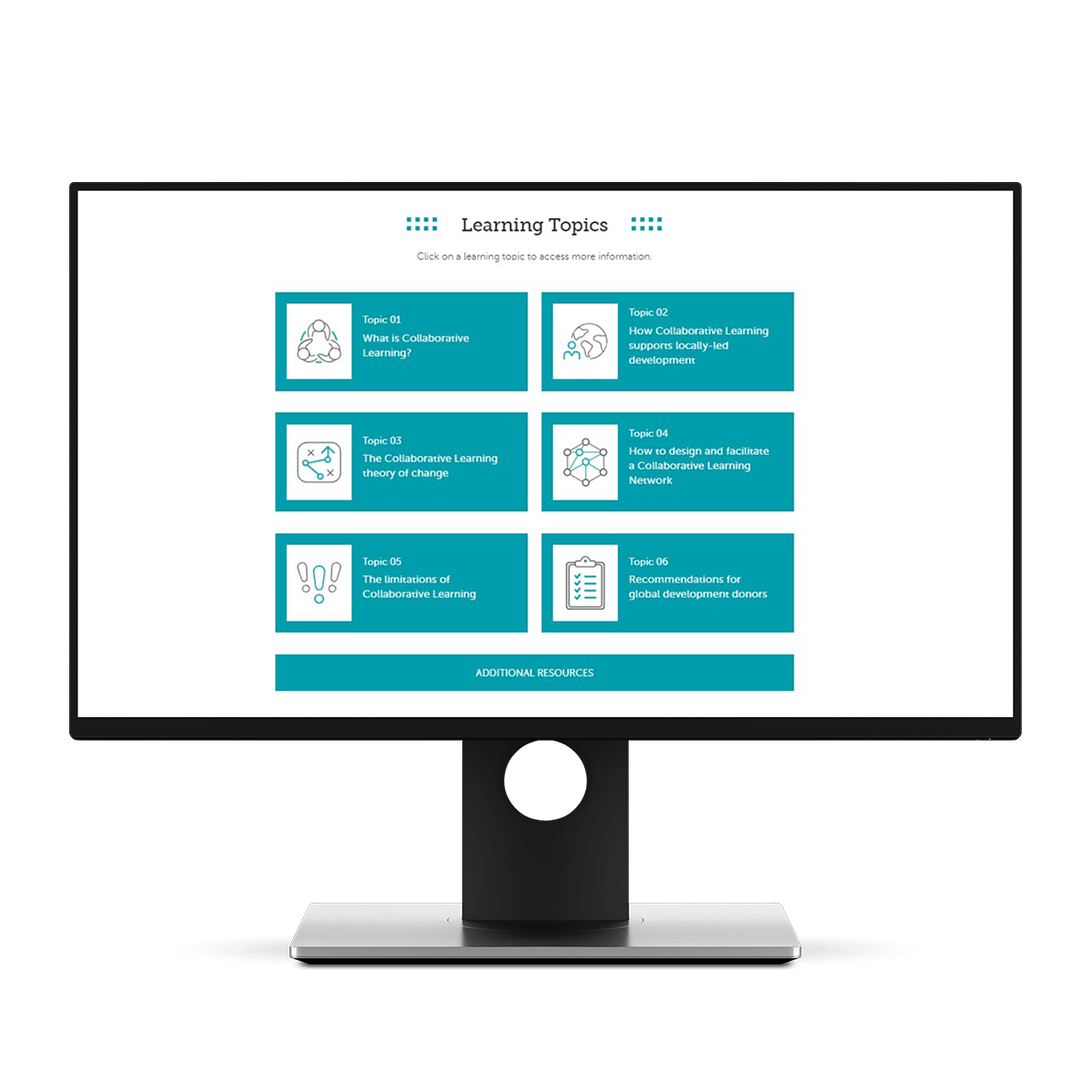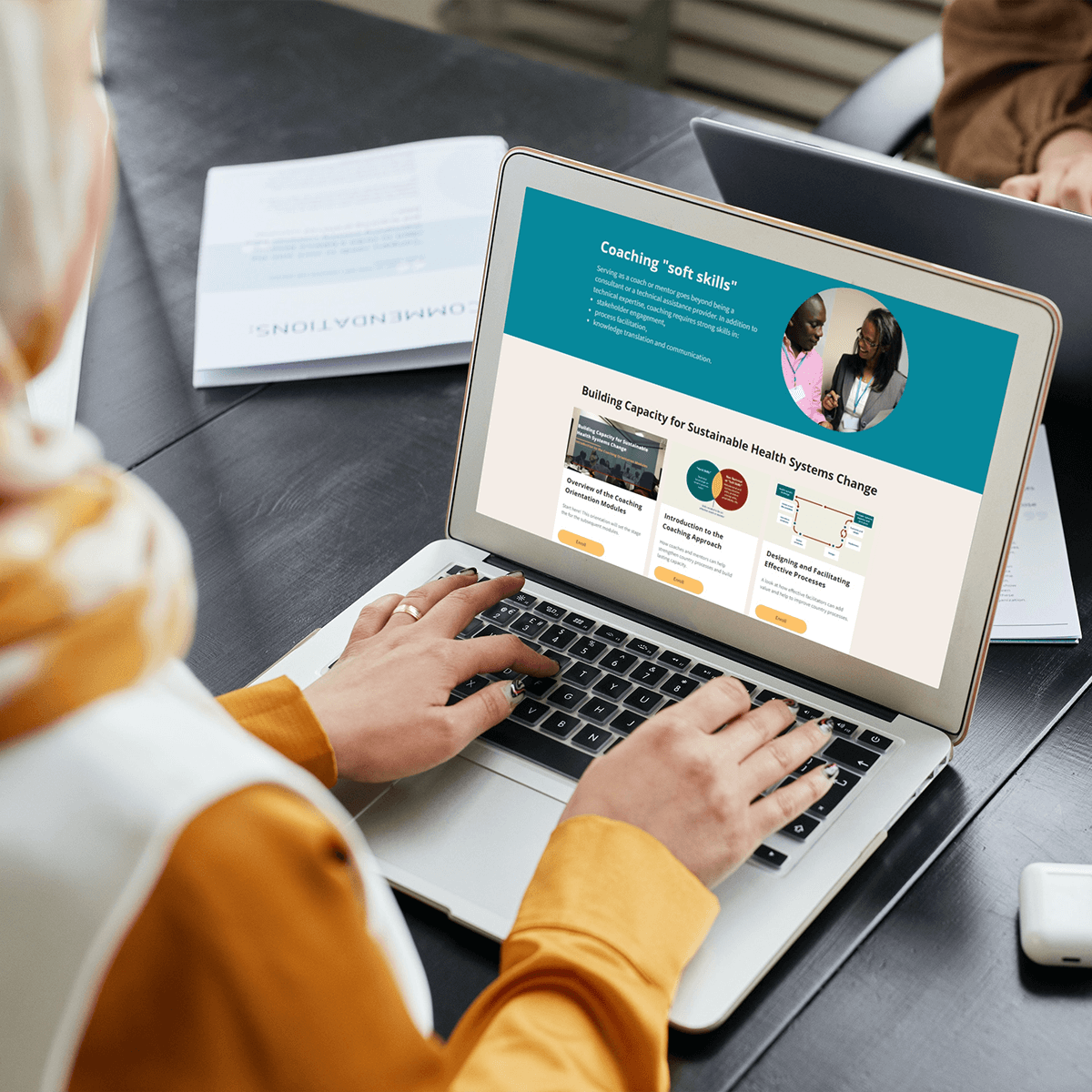Collaborative Learning
The Challenge
Leaders in low- and middle-income countries are focused on developing strong, self-sustaining systems that support improved outcomes in health, education and nutrition. They understand the challenges and realities of the local context, but often lack opportunities to systematically share their experiences or tap into implementation knowledge of peers in other countries. They often have access to global guidance and evidence on what needs to be done but are less likely to have access to practical “how-to” knowledge that can help them make faster progress toward their goals.
R4D is responding to the demand for more peer-to-peer learning opportunities that center the expertise and tacit knowledge of local change agents through our approach called Collaborative Learning.
Our Approach
Collaborative Learning brings together a deliberately organized set of participants, or change agents, that have common goals and are convened in a way that allows them to systematically learn from each other and co-create solutions to challenges of common interest.
This approach is country-led. It provides a structured process in which change agents determine priorities, set the learning agenda, identify and co-develop good strategies and promising practices, and shape the future direction of the Collaborative Learning community. Collaborative Learning — unlike traditional approaches to technical assistance — centers the expertise of local change agents and captures the valuable tacit knowledge of practitioners to advance systems change.
Collaborative Learning goes beyond static information-sharing between peers. Through in-person workshops and virtual exchanges informed by adult learning theory, practitioners exchange experience on what has worked, what has not, and why — and co-develop practical tools and knowledge products. This leads to increased ownership and uptake of the knowledge and best practices by those who were part of the process.
Impact through Collaborative Learning
R4D is working closely with our partners around the globe to apply Collaborative Learning to address complex challenges. Since our founding in 2008, R4D has launched or strengthened over 20 Collaborative Learning Networks, including:
The Joint Learning Network for Universal Health Coverage (JLN)
Since 2010, the JLN has grown from a community of six countries to a mature network of policymakers and practitioners from over 30 countries that are learning from one another to accelerate progress toward universal health coverage. Member countries have adapted and applied multiple co-produced resources, tools and guides to enhance the capacity and motivation of local leaders and improve health policy and practice.
The Linked Immunisation Action Network (Linked), formerly the Learning Network for Countries in Transition (LNCT)
Linked brings together immunization practitioners, policymakers, and partners from middle-income countries to identify common immunization challenges, share knowledge and experience, and support the implementation of good practices and lessons learned. Linked has demonstrated that a country’s political commitment, engagement in Collaborative Learning, and alignment of network offerings with policymaking processes and timelines can result in important health system achievements (see Armenia example).
The Primary Health Care Performance Initiative (PHCPI)
PHCPI brought together country policymakers, health system managers, practitioners, advocates and other development partners to catalyze improvements in primary health care in low- and middle-income countries through better measurement and knowledge-sharing. R4D supported action-oriented peer learning exchanges and an Online Forum for virtual dialogues and information exchange. Through Collaborative Learning, the community generated global knowledge and supported three countries (Colombia, Ghana, and Kenya) to advance their implementation of primary care networks.
The Strategic Purchasing Africa Resource Center (SPARC)
SPARC brings together a community of technical partners throughout Sub-Saharan Africa to strengthen strategic purchasing expertise to advance countries’ universal health coverage efforts. Through Collaborative Learning, Coaching and Mentoring, SPARC has enabled government actors to access learning and expertise from within their own countries and in neighboring countries.
The Partnership for Evidence and Equity in Responsive Social Systems (PEERSS)
From 2018-2023, PEERSS brought together 15 research and knowledge translation organizations across 13 countries (Brazil, Burkina Faso, Cameroon, Chile, China, Colombia, Ethiopia, Lebanon, Nigeria, South Africa, Trinidad and Tobago, Uganda, and the United Kingdom) to learn from and support one another in strengthening the use of research evidence in policymaking, for achieving progress in social systems. PEERSS provided a valued space for learning and sharing that helped to accelerate progress in evidence-informed policymaking at the country and regional levels, and promote strong partnerships that are expected to last beyond the life of PEERSS.
The Nigeria Subnational Joint Learning Network for Universal Health Coverage (NJLN)
The NJLN connects practitioners, policymakers, and partners across states and between states and the federal level to enable learning exchange and knowledge co-production in support of health care financing reform. In 2018, network members co-produced two practical knowledge products to support the implementation of Nigeria’s Basic Health Care Provision Fund, a “how-to” manual for designing and implementing state health insurance and a toolkit for improving primary health care facility financing arrangements.
The School Action Learning Exchange (SALEX)
SALEX is a new community that builds and promotes the uptake of evidence by members, schools, and policymakers to implement promising school- and teacher-level approaches ultimately aimed at improving holistic learning outcomes of each child. SALEX members are reflecting on their evidence practices, building new connections and deepening existing relationships across the global education ecosystem.
Collaborative Learning Toolkit

Gain in-depth insights into Collaborative Learning. Our toolkit is intended for anyone who supports or seeks to implement a Collaborative Learning Network.
















